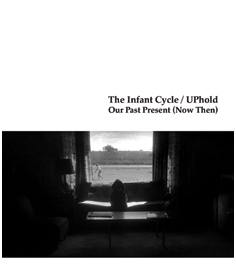[reviews]
afe086mcd
the infant cycle / uphold: our past present (now then)
webzine, germany, july 2007
The benefits of sharing: A joint release after 15 years of mutual respect.
This is the dilemma facing creatives these days: market forces dictate that good decisions are those taken swiftly, while the results of artistic endeavours such as this one demonstrate the benefits of being patient.
The roots of both projects involved in "Our Past Present (Now Then)" go back to the early 90s, to the tape scene of their native Canada, to the same ideals and engagements in the same bands. Their personal friendship and musical understanding has somehow only translated into occasional collaborations. And yet, after 15 years at the frontline of the underground, here it is: A joint release that proves none of these years has been in vain.
Enclosed in the lucidly designed cardboard sleeve are quiet and nostalgic black and white photographies by Gene McSweeney taking one back to the streets of the 50s and 60s, to golden childhood memories, hazy days and the comfort of your parent's living room – as well as two Mini-CDs both clocking in around the twenty minute mark.
On the first one, Jim DeJong (aka The Infant Cycle) continues his efforts of sifting through his vault. Various recordings from different sessions are reworked, using up-to-date techniques, and recombined in a single, continous piece. It is an ongoing process in search of an accurate representation of his true personality. After all, we are always a product of every moment preceeding the one we are experiencing right now.
Musically, the "Unrelated Work Tapes 7/7/04" are a fine and focussed affair: sounds of concrete objects, such as water tanks and record playout grooves are juxtaposed with the utterings of manipulated instruments like a Korg Poly-800 synthesizer or cymbals to form weightless and translucent atmospheres. DeJong likes to build his drones from short melodic lines or impulses rather than long sustained tones and the result is therefore simultaneously lost in a kinetic reverie and in constant motion. We don't like comparisons, but let's say it before someone else does: fans of The Hafler Trio will not be disappointed. Heavenly music for your first cup of coffee in the morning.
Uphold's contributions are definitely a contrast to this piece of minimal electronics: darker, more closed and concrete, they embrace hypnotic motives, vocal samples and even rhythms made up of resounding bell tones. And yet, these moments of clear definition flow in and out of drifting passages, where all of the main elements are in a disentangled state of tranquil chaos.
Despite their immediate appeal, none of the tracks sheers out of line: Muffy St. Bernard, the man behind the project, knows he could build triumphant hymns from his material, but opts for creating dense mood pieces instead, which are all concisely arranged instead of just drifting anywhere: this music wants to be listened to attentively. Thanks to its stylistic bredth, it is also a strong statement by an artist who has managed to integrate the influences gathered from plentifold musical encounters into a cohesive language.
The compositions were obviously not written with a split release in mind, nor are they conceptually linked. Their diverging scopes also suggest that the approaches of St. Bernard and DeJong differ greatly and are no onbvious matches. That is exactly why "Our Past Present (Now Then)" works as a collaboration: each party brings himself in completely and yet accepts the presence of the other in a highly personal space. That, too, is at conflict with the rules of our times: market forces preach the gospel of egoism, yet artistic endeavours such as this one demonstrate the benefits of sharing.
[Tobias Fischer]
